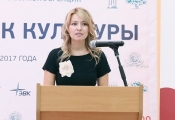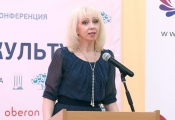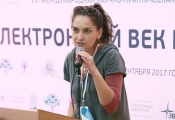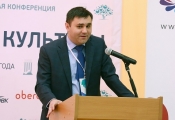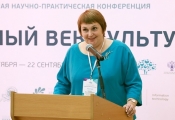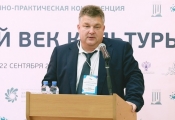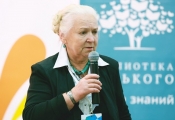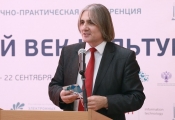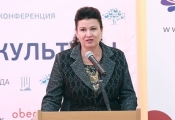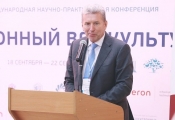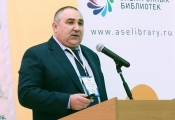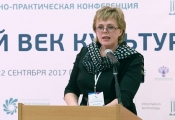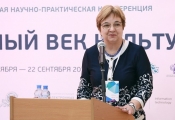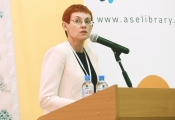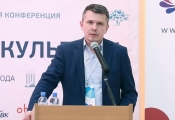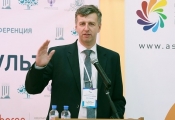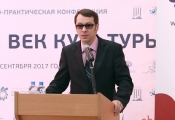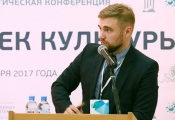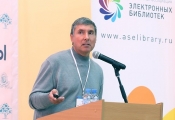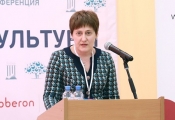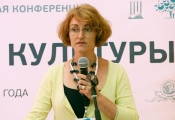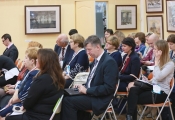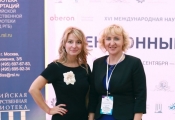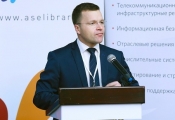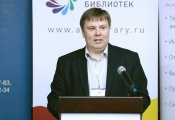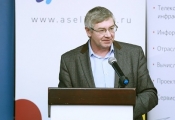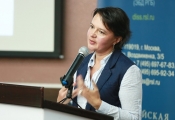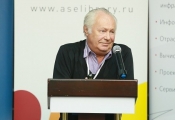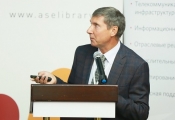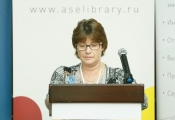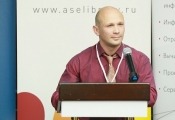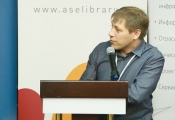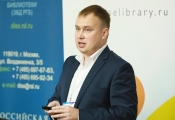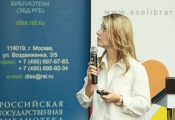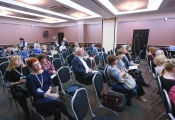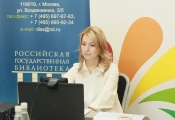Summing up the results of the 16th Annual research and practical conference “Digital Century of Culture”
13.10.2017
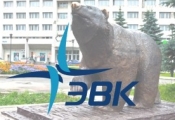 |
18 – 22 September 2017 the city of Perm hosted the 16th Annual research and practical conference “Digital Century of Culture”. It was organized by the Ministry of Culture of the Russian Federation, the Russian State Library, the Russian Association of Digital Libraries (NPP “ELBI”) and the Perm State Regional Universal Library named after A.M. Gorky. The “Oberon” company was the general sponsor of the conference.
The conference was traditionally broadcast directly from the official website of the Russian Association of Digital Libraries www.aselibrary.ru, and the events were followed online by specialists all over the world.
The research agenda of the “Digital Century of Culture 2017” was composed of the two – day plenary meeting and of the final guest session.
|
Nina Avdeeva’s
greeting speech
|
19th September 2017 the conference was given a start by Nina Avdeeva, head of the Administrative department of management and monitoring service for clients of the Russian State Library and IT director of the Russian Association of Digital Libraries. She introduced to the audience the book of theses of the conference speeches having already been printed, then she handed out the copies to all the participants of the “Digital Century of Culture”. The book was to enter the collections of the Russian State Library as a legal deposit copy. After that Nina Vladimirovna wished everyone to work fruitfully at the conference meetings.
Elena Pisareva, head of the Library Division of the Department of science and education of the Ministry of Culture of the Russian Federation, read out the greeting letter by First deputy minister of Culture of the Russian Federation Vladimir Aristarkhov. As it was
pointed out, the conference turned out to be a certain centre focusing views of all the representatives of the culture community, particularly of “those ones who would preserve and augment volumes of spiritual and moral values”. That year the conference was kindly met in the Perm region. The speaker saw the target aims of the event attracting attention to urgent problems of library informatization, getting acquainted with the latest products by leading software developers and getting realized relevant projects. From the Department of science and education and from herself, Ms Pisareva thanked the organizers and the participants of the conference for the opportunity to share experience, attentive attitude towards each other and thorough preparations undertaken when organizing the “Digital Century of Culture”.
|
Elena Pisareva
|
|
Anna Bocharova
|
Anna Bocharova, head of the Department of the development of higher education and science of the Ministry of Education and Culture of the Perm region, was the following speaker to greet the audience. She wished them preserve soft and joyous recollections from their visit to Perm and emphasized a particular importance of the theme of the conference for the educational and cultural environment.
|
Yevgeny Yashin
|
Yevgeny Yashin, the director of the LLC “OBERON” in cooperation with organizations, congratulated the participants of the “Digital Century of Culture” with its opening. The speaker focused his attention on the problem of a quality transfer from information to digit when all the necessary data gets available online within a moment. Meanwhile the conference itself provided an opportunity to distinguish vectors of advancement for the latest technologies and to determine the most significant aspects in which they could be developed and implemented.
|
Elena Seziomina
|
In course of her greeting speech, Elena Seziomina, the director of the Perm State Regional Universal Library named after A.M. Gorky, marked involving youngsters into information and cultural environment as a most significant aim for libraries. She wished the audience to enjoy their time in Perm and to succeed in their work at the conference.
|
Igor Gruzdev
|
Igor Gruzdev, IT director of the Russian State Library and the director of the Russian Association of Digital Libraries, was the following speaker to greet the participants of the conference. He emphasized that its 16 – year history changed its themes to be discussed dramatically. Mr Gruzdev expressed his hope to see the achieved results being practically applied.
|
Raisa Zobacheva
|
Raisa Zobacheva, the director of MBOU “S.P.Diagilev Grammar School № 11”, reminded the audience of the diverse and rich history of the Perm region, she spoke about moral values of the Russian people and about the necessity to transfer this experience to future generations; she would also point out the importance of upbringing thinking, understanding and compassionate people.
|
Alexander Protasevich
|
Alexander Protasevich, deputy minister of culture of the Perm region, in his greeting speech to the participants of the conference, emphasized that among the priorities of the development of the Perm region there were creation and implementation of modern information technologies, and formation of a comfortable urban environment. The “Digital Century of Culture” was stated as to satisfy all the demands of the current trends of cultural policy, and the results of its meetings could turn out to be valuable for the Ministry of Culture of the Perm region.
|
Liudmila
Drobysheva-Razumovskaya
|
Liudmila Drobysheva – Razumovskaya, rector of the Perm State Institute of Culture, told the audience about changes in people’s attitude towards the profession of librarian. Among the future students there had raised the number of those who wanted to become a librarian, and that was the fact witnessing the demand for such specialists in the Perm region.
The speeches of the first working day of the conference were devoted to the implementation of latest computer technologies in library management, in popularizing their resources among the reader environment, as well as to the information support of research and education resources.
|
Alexander Visly
|
The director general of the National Library of Russia Alexander Visly in his speech “National Digital Library” described main stages and aspects of its development. For that moment the NDL collections could boast of approximately 4 million digital items, and in compliance with its status of a national library it could provide services for readers from any of the regions of Russia, and of anywhere from the whole world. The matter of a special importance for the National Digital Library as viewed by A.Visly was the point from which there was realized reader’s access to legal deposits in the electronic form. There was no unanimity among the public concerning usage of electronic copies of works, and that hampered legislative initiatives targeted to find the solution for the problem of organization of access to such resources.
|
Oleg Neretin
|
Oleg Neretin who was the director’s adviser for the Federal Institute of Industrial Property presented his speech “Developing instruments for research and educational organizations defining and specifying research and technology priorities on the basis of patent data search and analysis”. The speaker introduced to the audience a new system PatScape capable of realizing patent data search and of structuring that in such a way that user could figure out the research directions of priority and of prospects, too. The software was already working and available for free usage for all research and educational organizations accredited at the Federal System of Research Organizations Monitoring. For the moment the PatScape resource was in active use by citizens of different Russian cities and by those ones from the Silicon Valley (USA).
|
Natalya Afanasyeva
|
Natalya Afanasyeva, head of the Archives Agency of the Perm Region, spoke on “Information resources of the Archives of the Prikamye”. Information resources would make it possible to broaden the reading rooms of the archives as vast as the world wide web. That would preserve the authentic paper documents and at the same time popularize their contents without actual limits. Information policy concerning archives supposed expanded access to such sources, its convenience and high speed, compliance with the standards of the modern information society and diversity of forms and channels of information receipt. Resource “Generations of the Perm Region” launched in 2008 at the State Archives of the Perm Region, included over 4300 metric books, revision lists and confessional reports with the data on the citizens of Russia and 94 more states. The information system provided user work in their private office, making corrections and their check, as well as creating tabs. Correction making brought users points, and a possible bonus for them could be scanning genealogical sources by request. The Perm State Archives of the Social and Political History had prepared virtual exhibition “The Perm period of grand prince Mikhail Aleksandrovich’s life and his death 12 – 13 June 1918”. It presented photos of the Perm period of that man’s life, witness statements of those ones who had organized and realized that murder, newspaper articles dated by the year of 1918 and documents from the collections of the Perm Regional Committee of the Russian Communist Party of Bolsheviks and of other organizations. There were available digital thematic databases and document collections as well. In prospects there was planned the development of a united archival information system.
|
Galina Yevstigneeva
|
Galina Yevstigneeva, library director of the Russian National Public Library for Science and Technology, presented her speech “Information support of science and education within the framework of national subscription. Developing the project by the Ministry of Education and Science of the Russian Federation”. The project of the national/centralized subscription started in 2004, was directed at financing licensed access to leading foreign scientific resources, full – textual and factographic databases, and also databases of research citation indices. The national subscription supposed access to scientific and technology information from all the IP addresses of the Russian Federation. The idea of the centralized subscription was access through a united operator which would be responsible for licence agreements with right holders of the relevant data and sublicence agreements with research and educational organizations. The operator would also be in charge of the technical support services and information usage support, monitoring and presenting statistics of its usage. Since the year of 2014 the role of operator had belonged to the Russian National Public Library for Science and Technology. Among future users of the subscription there could be found only research organizations selected on the basis of open quests and information provided by the Federal System of Monitoring of Research Organizations. The amount of the resources within the project raised with years, and by 2017 it included 22 databases of full – textual documents and 2 databases of science citation. In plans there were to provide access to Web of Science database for all research and educational organizations of Russia (which overcame 1600).
|
Evgeniya Guseva
|
Evgenia Guseva, management counsellor of the Russian State Library, entitled her speech “Standardization of innovative activities – tendencies 2017”. There she described new regulations in force since the beginning of the year which contained requirements for innovative activities which could influence the development of national libraries in a positive way. The aim of the standardization process as viewed by the author was to equalize the quality of products with their original functional purpose. While there remained a problem of lack of distinct criteria which could help to adjust proper innovative characteristics in these or those phenomena, this including library work in Russia. In that connection setting standards for the sphere of innovative activities could be considered an important stage regarding raising quality of their resources and services.
|
Vadim Andreniuk
|
Vadim Andreniuk, deputy director in cooperation with libraries and higher education institutions of the “ELAR” corporation, presented his speech “Developing library portal of Moscow region”. The aim of the project had been to work out a united system for all the information resources of libraries of the Moscow region in order to raise quality of reader’s service. The united information system of accounting of library collections of the Moscow region (EISUB MO) provided access to union catalogue of all the libraries of the Moscow region and to all the existing full – textual electronic copies of open – access books. Further prospects for the portal were seen in proceeding with digitalizing editions, providing service in remote ordering books, enlarging union catalogue and its replenishment with items from other open sources, quick search of reference materials concerning libraries and their collections. For that moment the speaker claimed 4 235 700 bibliographic records to be put on the portal, 3 180 digital copies of editions available and 6 165 users registered. Readers could work in their private offices, look through bibliographic descriptions and information concerning location of the collections, enjoy the capabilities of a simple or advanced search, save the selected pages and comments to them. Each of the represented libraries had a page of their own with the brief information about it and tools for communication with readers. The portal had sub – system “Monitoring” providing statistics and other details concerning work of the libraries.
|
Yuri Chekhovich
|
Yuri Chekhovich, executive director for CC “Antiplagiat”, presented the latest technology of revealing translated plagiarisms in Russian research texts which come from documents originally created in English. The speaker shared the results of the search conducted with the help of the software. The test had been carried out with the research publications from the editions of the Russian Index of Research Reference Materials provided by the eLibrary.ru resource. Over 20 000 articles turned out to contain translated plagiarisms in significant volumes. 25 000 dissertation theses tested revealed 17 works containing such plagiarisms. The module for tests used neuron networks taught to analyze textual documents. For setting the module there had been used data of several corpuses of parallel and compared documents. The results of teaching and testing were evaluated by independent experts.
|
Sergey Butsyk
|
Sergey Butsyk, pro – rector in educational work of the Chelyabinsk State Institute of Culture and Arts, spoke on “Managing collection development of higher education institutions of culture by means of Digital Library Systems – from modelling to practical experiments”. A rather high price of connection to digital library systems (DLS) and a rather narrow volume of the specialized content remained the main problems of use of such systems at the higher education institutions of culture. Partnership agreement which could solve all those problems was also not so easy to be attained due to the existing conditions of legal, organizing and technological and strategic character. In 2015 – 2016 there had been carried out an experiment aimed at raising the part of the subjects completed with the educational editions from the DLS and optimizing expenses of the higher education institution in order to increase the volumes of such editions. As a result the part of those editions overcame 50%, and the year of 2017 saw the continuation of the experiment with a broader sphere of subjects. The majority of editions from the collections of the digital library system was used meanwhile with training students for the “Scenic Arts” specialization.
|
Anton Yerpuliov
|
IT director of the Russian State Library Igor Gruzdev and head of the Department of organization and management of Digital Library collections of the Russian State Library Anton Yerpuliov presented their speech “System of acquisition of legal deposits of printed editions in the electronic form at the Russian State Library”. For the moment the speakers would find the volumes of the works coming insufficient. To raise the efficiency of the process they considered it obligatory to guarantee proper enforcement of Copyright for the documents transferred and a certain commercial interest for their authors. Still the Russian State Library possessed a specialized electronic resource satisfying all the aforementioned conditions. There authors could form a request for a private office. On the basis of the request and their electronic signature such private office would be opened, and author would be able to download their document into the system themselves. The software would check the data integrity, chromaticity, spacing and presence of textual layer. Then operators of the system would scrutinize the text in order to decide whether it could be accepted to the Digital Library of the Russian State Library. Mr. Yerpuliov and Mr. Gruzdev shared the statistics with the audience, and according to the statistics data, 134 247 users explored the resource, who were mainly from Moscow, Nizhniy Novgorod, Barnaul, Omsk and Krasnoyarsk. The network of private offices facilitated the transfer of 43 325 printed legal deposits in the electronic form.
|
Kirill Kolosov
|
Kirill Kolosov, head researcher of the Russian National Public Library for Science and Technology, presented his speech “Participation of the RNPLST in stocking National Digital Library (NDL) and developing technology of transferring digitized resources of libraries using the IRBIS 64 automation system to the NDL”. The Digital Library of the Russian National Public Library for Science and Technology had been started in 2006, and since that time there were coming books digitalized by the Scanning Centre, journal articles from “Scientific and Technical Libraries”, documents from collections of research works edited by the library and the materials of the “Crimea” and “LIBCOM” conferences. The digital library presented simple and convenient for user search tools. In 2010 there was installed hardware – software complex of the electronic archives using software product “DocuShare” by “Xerox”. For that moment “Xerox DocuShare” was a technological basis for the processes of preparation, arrangement, preservation and presentation of digital documents of the Russian National Public Library for Science and Technology. The document arrangement process of the digital library included the following stages: registration of the edition within the system, scanning, text recognition, creation of attributes (annotating), automated placement into the electronic storage. In 2016 the amount of digital editions in the library was 1151, and 16677 books were delivered to remote users (45 books a day). Meanwhile thematic collections simplified user’s search among the large amounts of electronic documents.
|
Еlena Gruznova
|
Elena Gruznova, head of the department of cooperation with the NDL of the National Library of Russia, presented her speech “Urgent problems of the NDL development as viewed by the participant”. An aspect of importance for the National Digital Library there was regarded management of the access to the documents of the distributed storage and provided to the library across the technological platform. While setting connection to the platform of the National Digital Library the participant lost such options as selecting documents to be digitized, placing latest data concerning their library, arranging material compilations, work with the functions of the electronic reader card. Breaks of the system work happening, the participants had to address to the operator of the National Digital Library being completely disabled to remove the problems themselves. In case the rights of access management were transferred to the participants the problems could be solved in time, and even prevented. For presenting documents there was used rather a narrow set of attributes, and in practice right holders would apply more flexible approaches for distributing access rights. Among the information resources of the National Digital Library there was no capability to inform user whether a source could be available in open access before its opening. The sets of statistics parameters applied on the participant’s private office and on the platform itself differed greatly, and as the result there came statistics absolutely useless for evaluating the work of the library and for introducing corrections. For developing cooperation on the technological platform there were necessary the similar approaches to ways of evaluation of the main technological processes within the library, those processes were to be realized from the participant’s side, and a strong need for the united protocol of cooperation by the technological platform was stated as well.
|
Аnna Titova
|
|
Participants of
“Digital Century of
Culture 2017”
|
Anna Titova, 1st category editor from the Department of website editing of the Russian State Library, presented her speech “From virtual exhibitions to SMM – the experience of the RSL of exposing collections on the Internet” (which had been prepared in cooperation with Svetlana Hvostova, head of the Department of website editing of the Russian State Library). Unfortunately, exhibitions which were properly destined to make book closer to its reader would only enlarge the distance. Reader could not take a book with their hands, and it was not always convenient when the book was inside the showcase. Books over there could not be leafed through, one could not view illustrations and pages they found interesting… On the contrary, virtual exhibitions made it possible to show unbounded volumes of materials to a wide circle of Internet users. The Russian State Library would have over 10 exhibitions points working, and the Ivanovsky Room opened not long before had been equipped in a special way to explore the capabilities of modern electronic technologies. Touch screens provided visitors with capability to flip the pages of digitized books and to scale the images. Exhibitions could be supported by audio and video materials. Content of all the virtual exhibitions was available on http://presentation.rsl.ru/. Use of digital technologies had already helped the Russian State Library to hold thematic exhibitions and lectures with demonstrations of unique exhibits, and it would also contribute to making all the materials widely accessible for all the Internet users.
|
Nina Avdeeva
and Nataliya Timofeeva
|
The total atmosphere of the first part of the plenary meeting could be characterized as warm, friendly and creative. The meeting was conducted by Nina Avdeeva, head of the Administrative department of management and monitoring service for clients of the Russian State Library, and Nataliya Timofeeva, head of the Department of digital resources and periodicals of the Perm State Regional Universal Library named after A.M. Gorky.
The meeting was held in the hall of the Perm State Regional Universal Library named after A.M. Gorky with the exhibition “Industrial landscape lexis – breaking through stereotypes” on. It had been prepared together with the Perm Art Museum. The project had acquired the support of the V. Potanin Foundation as a participant of the parallel programme of the 4th Ural Industrial Biennale of Modern Art. Visitors could enjoy a large collection of paintings and graphics, of periodicals, and collections of documents reflecting industrial processes of the Perm region and the way they influenced lives of people and nature. The meeting over, all the participants were invited to the banquet devoted to the opening of the conference.
|
Pavel Shevyrov
|
The conference work to be continued, 20 September 2017 the Minister of Information Development and Communications Pavel Shevyrov presented his greetings to the audience. The speaker pointed out that the development of the digital economics was a task of the priority for the Russian Government, while the development of the infrastructure and communication spheres within the territory of the Perm region were among the priorities of the local authorities. In the conditions of the total digitalization libraries were to keep pace with all the other spheres. Transferring necessary information and relevant content to a wide circle of users, including that information into the educational process, close integration of digital library technologies with the digital education technologies were all to be meant while developing the library sphere. Together with the Ministry of Culture, there was realized the programme of connecting regional establishments and municipal libraries to high – speed Internet. There were also considered variants of involving platforms and audiences of the libraries into usage of modern information services, such as video conferences and broadcasts of different cultural events on the library basis. Libraries could also provide diverse services those including electronic ones which would contribute to developing citizens’ computer education. The libraries were to host a lot of projects able to raise attendance to those establishments and to diversify people’s life within the remote territories of the region.
|
Victor Meteliov
|
Ten other speeches were presented at the meeting. Victor Meteliov, IT director of the Perm State Regional Universal Library named after A.M. Gorky, spoke on “Transforming libraries into libraries of information society”. Among the important tasks of the development of libraries of the Perm region there was forming a united regional information space and providing access to it. According to the 1 July 2017 statistics, 502 libraries were connected to the Internet, and in 39 of them the access speed was over 10 Mbit/s, still at 268 libraries it only remained 1 Mbit/s. The information centre of a greatest significance was a regional library where there were formed regional digital collections and there was provided access to them, with editions being digitized and educational and publishing centre being functioning. At the central inter – settlement library there were developed local information resources, while at the rural library there were only located remote workplaces for users of the information resources. The development of the resources in the electronic form had to compensate lack of paper book collections, to raise the quality of library services, to help the disabled people to access such services and resources, to carry out corporate and educational events for a wide circle of librarians avoiding trips from one settlement to another.
|
Igor Martynov
|
Igor Martynov, head of the Sector of Western European Art of the Perm Art Museum, spoke on “Museum & library. Archaeology of industry in the electronic age”. As considered by the speaker, art museum of the modern times was the only institute working consistently over the problems of transferring visual experience from one generation to another. In 2015-2016 at the Perm Art Museum there were realized three exhibition projects in cooperation with the Perm State Regional Universal Library named after A.M. Gorky – “Artist and Book”, “Homer, Virgil, Ovid. The Russian Time of Antiquity” and “Having returned from the far – away journeys…”. When preparing these exhibitions there were used different digital resources, this including touch stands and showcases. There was also developed specialized software with flash technologies implemented providing visitors with the capability of viewing information concerning the books exhibited and their pages magnified (2 – 4 pages at a time). If left alone, the software skipped to the title page which contained a simple set if user instructions. Virtual tours and 3D-views of certain exhibitions were available on http://permartmuseum.ru/ in part “Gallery – Virtual tours”.
|
Ekaterina Sirotina
|
Ekaterina Sirotina, deputy director of the Municipal Library Union of Perm, presented her speech “Information security in the electronic environment – projects by MBUK “Municipal Library Union of Perm”. In 2017 MBUK “Municipal Library Union of Perm” was a participant of federal project by mobile operator “MTS” “Kids on the Internet” suggesting organization of an educational interactive exhibition and lessons of safe work on the Internet. The project was aimed at informing children, their teachers and their parents about the potential risks of using Internet, ways of defence from security risks and capabilities for education, communication and free time. The exhibition was composed of the five thematic areas symbolizing useful, merry, individual, dangerous and secure aspects of work on the Internet. The project was carried out at M.A. Osorgin №25 Library, and there the specialists of MBUK would invite groups of school children, they organized schedules and gave lessons. Over 2000 school children attended the event. Then, in the same 2017 there were organized courses of computer skills for elderly people. The trainings were held at 10 libraries of MBUK in all the parts of the city.
|
Viacheslav Dimov
|
Viacheslav Dimov, head of the informational service of MBOU “S.P.Diagilev Grammar School № 11”, spoke on “Electronic educational environment”. The grammar school possessed a physical server of their own, and any of the pupils could connect the wi-fi and work on the Intranet network. Each of the teachers had a website of their own, and even the library possessed its site. The information resources of the grammar school had been 15 years in work, and they covered all the aspects of the school life, that including computer informing parents on their child’s coming and leaving the school. All the digital textbooks were represented on the website, and they could be used from a pad, or a home computer. The information system of the grammar school even involved technologies of augmented reality. Users could access virtual excursions over exposition halls. The grammar school would often practise online broadcasts. Teachers made videos of their lessons themselves. Among the numerous projects of the grammar school “Fairy tales by Arina Rodionovna” was the most popular one. Through the information resources of the grammar school audio recordings of the fairy tales were available for Russian – speaking citizens of the USA and their children. There was also represented a range of audio and video excursions for diverse places of Russia traditionally attracting tourists.
|
Kirill Kolosov
|
Kirill Kolosov, senior researcher of the Russian National Public Library for Science and Technology, presented his speech “Developing solutions and new capabilities of library automation system IRBIS64 – digital library IRBIS64+ and its use as an open archives, cooperation with the United Portal of State Services, supporting technologies of web – services” (prepared in co-authorship with Alexander Brodovsky, head of the department of the Russian National Public Library for Science and Technology). The new functional of the IRBIS64 system included full – textual search with usage of the “relevance” criterion on the basis of automated division of texts into pages and their word – by word indexing, as well as representing search results in descending – relevance order of the documents (in descending – relevance order of the pages found if one document is concerned). Users could access page – by page viewing of full texts with the found requested words being marked and a capability of navigation among the relevant pages, title and personal tabs. There was also present a highly – developed system of final users’ access rights to full texts and the accounting system of their accessing full texts. Functional capabilities of the IRBIS64 were broadened due to use of the data exchange module by OAI-PMH log enabling transmit metadata from the IRBIS64+ to service providers of open archives, and of server Z64 (server Z39.50) providing integration with outer information systems, which could work by SRU/SRW log, that including in a web – service mode. Server Z64 was used for work with the United Portal of State Services, and for that moment the speaker pointed out the demand for the software complex for interaction of the IRBIS64+ system and the United Portal in the following regions of Russia: the Republic of Buryatia, Ekaterinburg, Kaluga, Kurgan, Kursk, Nenets Autonomous District, Orel, Tyumen, Chita, the Republic of Chuvashia, Khanty-Mansi Autonomous District, Yaroslavl.
|
Alla Pashkova
|
Alla Pashkova, head of the Department of integrated library systems of the National Library of Russia, spoke on “Union Digital Catalogue – Step by Step”. The project had been started in 2017. According to its developers, the catalogue had to contain bibliographic records from the Russian State Library (Moscow) and the National Library of Russia (St. Petersburg) – one document to have one record. The catalogue was destined for readers searching for a book and for organizations searching for bibliographic records, too. The both of the national libraries were using one and the same software for their catalogues, still the formats of record creation differed, that was the root of problems when making the union catalogue. For the moment of speaking the process of borrowing records from one catalogue into another was under way. The volume of the records brought from the catalogue of the Russian State Library and taken to the catalogue of the National Library of Russia had increased by 10% if compared with the data of 2016. With the help of the “Primo” software there was developed an interface for the union catalogue enabling user select different records of a document, as well as transfer to the local catalogue of either of the libraries and acquire the information about the access conditions for the documents. Bibliographic records could be downloaded. According to the speaker, the union catalogue contained over 3 million records for the documents of the years of 2000-2017. Differences in the practices of local cataloguing at the Russian State Library and at the National Library of Russia prevented automated merging of records in the catalogues, thus there remained need in ‘manual’ monitoring of the process of completing the union catalogue. Among the additional capabilities of the union catalogue there could be mentioned such ones as a double control of the quality of records, improvement of search relevance and detecting organizations which would not send legal deposit copies to the libraries. For the moment the union catalogue was available on http://eek.nlr.ru.
|
Alexander Indenbom
|
Alexander Indenbom, head of the group of the Informatization Department of the National Library of Russia, presented his speech “System of information protection of the National Library of Russia – Stages of a long way”. In 2011, the information system of the National Library of Russia had used anti – virus software, together with technologies of reserve copying and of virtualization, still it lacked a system approach to the information protection and any policy in that sphere. In 2012 there were realized the following initiatives: audit of personal data and stage – by – stage implementation planning. Still, if categorizing personal data was considered, the weak points were corporate mail and counter parties’ personal data within the system of digital document circulation. According to the speaker’s view, the problem of stage – by – stage implementation could be solved by way of lowering the class of the information system of personal data, and it could also be solved with the help of different countervailing measures. In 2014 information protection was managed centrally, and the protection system itself included the following modules: analysis of the system safety, intrusion detection, anti – virus protection, protection from unauthorized access, protection of channels of communication and of firewalls, too. In 2017 the National Library of Russia implemented a software module of cyber-attack detection working with almost all protocols and presenting information in a way maximally convenient for the specialists. Among the tasks of priority planned for the year of 2018, there was network segmenting, upgrading the protection components, raising level of computer competence of the specialists working with the system and monitoring legislation of the sphere of information protection.
|
Arsen Borovinsky
|
Arsen Borovinsky, individual entrepreneur, developer of the ELiS library, presented his speech “Linked data as a basis of entities storing at the core of the digital library”. Any assertion concerning any entity (i.e. resource) could be modeled as “subject – predicate – subject”. Entities and links between them could be organized in the description of the world. The advantages of the RDF data format if compared with the MARC format were in the capability of making more links among the elements (MARC was known for a settled character of their relations). Unlike MARC, RDF enabled to get libraries linked with other information structures. At the ELiS digital library, there was developed a new core on the basis of the RDF. Entities and links could be typified or derived. At the ELiS core there was also used object – oriented programming, books had statuses of resources. The speaker was determined in his view that libraries ought to leave aside the MARC and use the RDF instead.
|
Vasiliy Pavlov
|
Vasiliy Pavlov, head of the Department of IT support of the Russian State Library, presented “Realizing project “Linked Open Data” at the Russian State Library” (in co – authorship with Olga Lavrionova). The project had been launched in 2015 by the grant of the Russian Foundation for Basic Research “Representation of classification metadata of digital libraries using the technology of linked open data” №15-07-05265. The demand to optimize thematic search tools prompted adding verbal formulae of BBK indices to bibliographic descriptions in order to increase the completeness of search. At the Russian State Library there had been developed a model of knowledge on the basis of BBK. At first there was used a semantic web on the basis of the language of data description RDF (Resource Description Framework) for data publication. Still afterwards the scheme of the description of BBK indices was changed into a “simple knowledge organization system” (SKOS) determining the vocabulary of semantic relations. The year of 2017 saw the continuation of work over the project. Use of specialized search means enabled to visualize the BBK GSK tree for reader and provide the latter with capability of navigation along that, as well as to show thematic categories in prompts for further search among the BBK indices, and also to show the source list by the set key words. All the achieved results were available on http://lod.rsl.ru/.
|
Nina Avdeeva
|
|
Participants of “Digital Century
of Culture 2017”
|
Nina Avdeeva, head of the Administrative department of management and monitoring service for clients of the Russian State Library spoke on “Culture of research publications” where she revealed main problems in structuring and presenting research texts. A research publication had to contain objective, true, full and new information concerning the subject studied, and the material had to be organized in full accordance with all the existing requirements. Each structural part of the work had its functional characteristic features, and additional elements (for instance, illustrative materials) had to be used for confirming author’s statements and would be supported by comments when necessary. An integral part of any research paper was regarded reference list or bibliography. The latter had to contain information sufficient to enable readers identify sources and the borrowed information itself. Following norms of research ethics supposed existence of distinct boarders between author’s opinion and that one shared with another researcher, author’s results and those ones attained by others, author’s text and the text quoted or paraphrased from external sources. The results of plagiarism tests carried out with over 3.5 thousand research texts at the Russian State Library revealed a serious problem of Russian science in breaking rules of quoting and other violations. Young researchers and beginning authors were invited to use the official website of the Digital Dissertation Library of the Russian State Library http://diss.rsl.ru/?menu=infoblockru/infoblockru289/291/&lang=ru where the specialists of the Administrative department of management and monitoring service for clients had placed a range of information materials which could turn out to be helpful for preparing research publications.
|
Video bridge from Perm
to Pushkino
(Moscow region).
Nina Avdeeva’s speech
|
During the event there was organized a video bridge from Perm to Pushkino (Moscow region). Nina Avdeeva presented her speech “Digital resources of the Russian State Library as a basis of development for science, education and culture” to the participants of roundtable “’Resetting’ libraries of the Moscow region. Urgency. Innovations” organized on the initiative of the local authorities of the Moscow region. The point of the speaker’s essential attention turned out to be the Digital Dissertation Library which was the largest database of digitized dissertation theses defended within the previous 20 years and earlier in practically all the subjects and specializations in Russia. The materials of the roundtable were regarded as principles for the resolution prepared by the Committee for problems of education, culture and tourism of Moscow regional Duma which pointed out the necessity of broadening capabilities of regional libraries in providing access to socially important information for readers, that including national electronic resources.
The speeches were met with enthusiasm and pure interest. Questions asked, there started a hot discussion.
The results of the conference were summed up at its final meeting 21 September 2017.
After that, the participants of the “Digital Century of Culture” conference were offered a rich cultural programme which included a sightseeing tour around Perm, a visit to the Perm Art Museum, visit to the Perm Opera Ballet Theatre (excursion and ballet “Korsar”) and Alexander Nikolaenko’s concert.
The participants of the conference managed to visit architecture and ethnography museum “Hokhlovka” which was the first Ural museum of wooden architecture under the open sky. The museum ensemble was located in the picturesque Kama river vicinity, and it included wooden architecture monuments of late 17th – second half of 20th centuries. The participant - of - the - conference paper set was completed by the booklet guide around the "Hokhlovka" museum developed by the staff of the Administrative department of management and monitoring service for clients of the Russian State Library. The main bulk of the copies of the booklet guide was transferred as a gift to the museum itself.
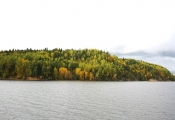 |
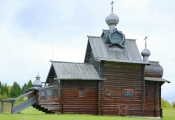 |
 |
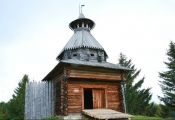 |
 |
 |
You are welcome to get acquainted with the research agenda of the conference over here: http://elvek.ru/predvaritelnaya_programma_konferencii/.
Video and information materials of the events of the conference are available on the official website of the Russian Association of Digital Libraries: http://www.aselibrary.ru/.


 Virtual Keyboard
Virtual Keyboard
 по-русски
по-русски

